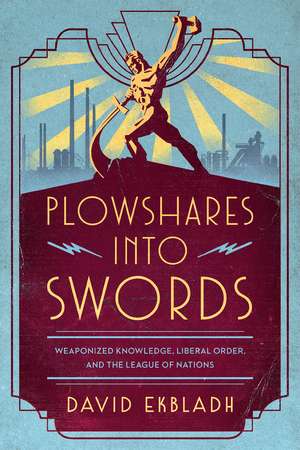Plowshares into Swords: Weaponized Knowledge, Liberal Order, and the League of Nations
Autor David Ekbladhen Limba Engleză Hardback – 30 sep 2022
In Plowshares into Swords, David Ekbladh recaptures the power of knowledge and information developed between World War I and World War II by an international society of institutions and individuals committed to liberal international order and given focus by the League of Nations in Geneva. That information and analysis revolutionized critical debates in a world in crisis. In doing so, Ekbladh transforms conventional understandings of the United States’ postwar hegemony, showing that important elements of it were profoundly influenced by ideas that emerged from international exchanges. The League’s work was one part of a larger transnational movement that included the United States and which saw the emergence of concepts like national income, gross domestic product, and other attempts to define and improve the standards of living, as well as new approaches to old questions about the role of government. Forged as tools for peace these ideas were beaten into weapons as World War II threatened. Ekbladh recounts how, though the US had never been a member of the organization, vital parts of the League were rescued after the fall of France in 1940 and given asylum at the Institute for Advanced Study in Princeton. However, this presence in the US is just one reason its already well-regarded economic analyses and example were readily mobilized by influential American and international figures for an Allied “war of ideas,” plans for a postwar world, and even blueprints for the new United Nations. How did this body of information become so valuable? As Ekbladh makes clear, the answer is that information and analysis themselves became crucial currencies in global affairs: to sustain a modern, liberal global order, a steady stream of information about economics, politics, and society was, and remains, indispensable.
Preț: 271.17 lei
Nou
Puncte Express: 407
Preț estimativ în valută:
51.90€ • 53.61$ • 43.19£
51.90€ • 53.61$ • 43.19£
Carte disponibilă
Livrare economică 04-18 martie
Livrare express 15-21 februarie pentru 42.74 lei
Preluare comenzi: 021 569.72.76
Specificații
ISBN-13: 9780226820491
ISBN-10: 0226820491
Pagini: 320
Ilustrații: 22 halftones
Dimensiuni: 152 x 229 x 30 mm
Greutate: 0.63 kg
Ediția:First Edition
Editura: University of Chicago Press
Colecția University of Chicago Press
ISBN-10: 0226820491
Pagini: 320
Ilustrații: 22 halftones
Dimensiuni: 152 x 229 x 30 mm
Greutate: 0.63 kg
Ediția:First Edition
Editura: University of Chicago Press
Colecția University of Chicago Press
Notă biografică
David Ekbladh is associate professor of history at Tufts University.
Cuprins
List of Abbreviations
Introduction: Knowledge in Exile
1: The League Is the Thing: International Society’s Super-University
2: Plowshares into Swords: Knowledge, Weaponized
3: Internationalist Dunkirk: International Society in Exile
4: The Rover Boys of Reconstruction: International Society in the American World
Coda: Great Leaps Forward
Acknowledgments
Archival Collections and Abbreviations
Notes
Bibliography
Index
Introduction: Knowledge in Exile
1: The League Is the Thing: International Society’s Super-University
2: Plowshares into Swords: Knowledge, Weaponized
3: Internationalist Dunkirk: International Society in Exile
4: The Rover Boys of Reconstruction: International Society in the American World
Coda: Great Leaps Forward
Acknowledgments
Archival Collections and Abbreviations
Notes
Bibliography
Index
Recenzii
“Peopled with vivid portraits of dedicated internationalists, Plowshares into Swords focuses on the League’s specialized agencies’ extensive contributions to building an understanding of the specific characteristics of the global economy and to the aim of establishing a liberal international order. It also documents the Americans' crucial involvement in Geneva prior to the war and during WW II, when League officials were given asylum at Princeton University, highlighting the roles played by key American individuals, government agencies, private universities, and the Rockefeller Foundation. Ekbladh makes clear the links between the League’s efforts and the ‘American world’ that emerged after 1945. Recommended.”
“Plowshares into Swords is not just a model of international history, it is a powerful reminder of the importance of information and knowledge in the making of the modern world, even in an age of heightened nationalism. Ekbladh gives us fresh insights into the intellectual latticework of the League of Nations and the role that American institutions and thinkers played in its making. Ekbladh’s research is astonishing and the significance of his findings is vital for readers today.”
“Ekbladh’s telling of the League of Nations’ life—and afterlife—is refreshing in many aspects. It is a story of economic and political knowledge; a story of liberal international advocates and the society they defended, protected, and supported; a story that intertwines the domestic and the international. Ekbladh’s archival work is precise, mobilizing a number of different historiographical strands, and his writing is sober, sharp, and accessible.”
"Plowshares into Swords offers us a storehouse of valuable and hitherto unexcavated materials that help us re-think certain dimension of inter-war geopolitics and the place of the League of Nations within them . . . . Above all, Ekbladh’s study reveals the extent to which the League of Nations—as a knowledge project more than one of so-called collective security—remained central to American hegemonic ambitions between 1920 and 1945. "
"Plowshares into Swords is an excellent book. It showcases extraordinary archival research and tells its story in crisp prose studded with well-turned phrases and memorable sketches of the main protagonists as they make their journeys through international society. It makes a significant contribution not only in the history on the League of Nations itself but also to the history of international society writ large, and of the rise of the United States to global hegemony. Finally, this book reminds us of the central role of data—its collection, processing, analysis, and presentation—in the construction of the institutions and expertise that came to define postwar international society."
